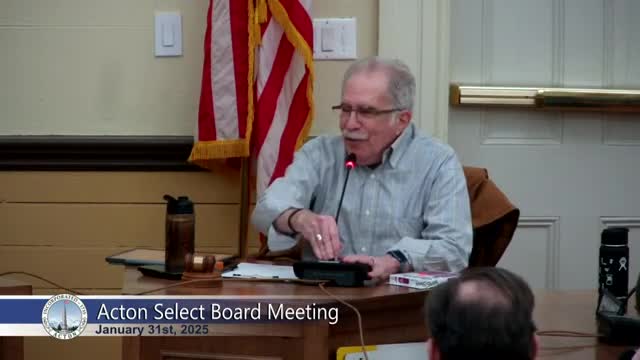Acton select board and finance committee split over $43 million DPW project; deadline tensions linger
Get AI-powered insights, summaries, and transcripts
Subscribe
Summary
Bart Wendell, resident and meeting facilitator, opened a joint session of the Town of Acton Select Board and Finance Committee to try to resolve differences over a proposed $43 million Department of Public Works replacement and the timing of any request to voters.
Bart Wendell, resident and meeting facilitator, opened a joint session of the Town of Acton Select Board and Finance Committee to try to resolve differences over a proposed replacement for the Department of Public Works (DPW) facility.
The central dispute at the meeting was whether to pursue a roughly $43 million project at the planned scope in time for an upcoming spring town meeting or to delay and “right‑size” the project. Finance Committee members repeatedly described the cost and timing as the primary problems; Select Board members and town staff said they had provided information and that delaying construction risks higher costs and continued safety and staffing problems at the existing facility.
The Finance Committee listed two main objections: that the project’s total cost is “too large” and that it comes at the wrong time after a recent override. “The cost of this project is too large, primarily, because the timing is so bad,” Finance Committee member Jim said. Several committee members said they would prefer to push a reduced project into fiscal 2029 rather than bring the full proposal to town meeting this spring. Jason, speaking for members of the Finance Committee, said, “Our initial … answer was FY29,” adding that any future ask should be a “right‑sized project.”
Town staff and members of the Select Board defended the plan as meeting identified needs for vehicle storage, covered equipment, office workspace and staff safety. “We have provided, I think, a huge amount of information that’s available on the project website,” Dean, the town manager, said, noting ongoing work with the project’s engineers and that value‑engineering has reduced earlier estimates. The group discussed a series of cost estimates that began as roughly $47 million, were reduced to $43 million through value engineering and remain subject to further fine‑tuning.
Committee members pressed for more quantifiable financial data. “We have asked for some information, financial information to help justify the cost and have not received that feedback,” Christie, a Finance Committee member, said, requesting specifics such as comparative equipment life‑cycle costs if pieces remain outdoors versus being housed. The Select Board and project team asked the Finance Committee to provide a written list of outstanding questions so architects and engineers could respond directly.
Meeting participants also described working‑condition and safety complaints at the existing DPW building. Select Board member Fran described the building she toured: “I see ceiling tiles that might fall at any moment. I see unsafe conditions for the people who provide services to our town … infestation of rodents.” Select Board members and some Finance Committee members said staff health and recruitment were part of the rationale for a new facility, while others countered that office space could be addressed through alternatives and that not all elements of the proposed scope are essential.
Technical and program details discussed included the building’s current planning documents, the consultant Weston & Sampson’s design work, and unresolved items such as how many ground‑source heat pump wells will be required. The project team said some figures requested by the Finance Committee had arrived only in the previous days and that another building committee meeting was scheduled for Feb. 12 to firm up estimates.
Beyond cost and scope, the meeting addressed political risks. Finance Committee members worried that asking voters for a large override so soon after last year’s override could erode public support for other town priorities. Select Board members warned that delaying construction could increase costs through inflation and that prior design payments and study work already invested by the town would be at risk.
Facilitator Bart Wendell asked each side to test the other side’s positions and to decide whether there was enough willingness to compromise to reach a jointly supported proposal. The meeting ended with an assignment for Finance Committee members to compile a written list of remaining information requests and a direction to deliver that list to the town manager or another designated contact within a short timeframe so the architects and project team could respond.
Votes at the end of the session were procedural: a motion to adjourn was made, seconded and carried by voice/roll call.
The two boards did not reach an agreement on a joint proposal to bring to town meeting. The Finance Committee indicated a preference to defer to FY29 and to pursue a smaller scope; the Select Board and town staff emphasized the project’s needs, the effects of rising construction costs, and ongoing design work that the towns’ consultants continue to refine.
Looking ahead, the building committee will continue value‑engineering work and the Finance Committee will provide a prioritized, written list of outstanding questions. A potential spring town meeting date mentioned during the discussion was May 6, but timing and any final funding ask remain unresolved.
